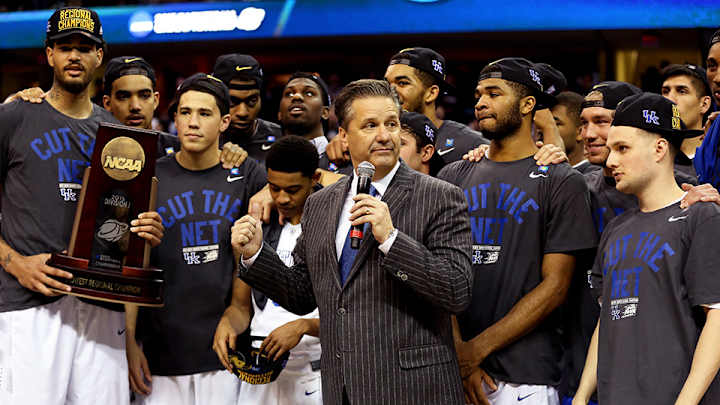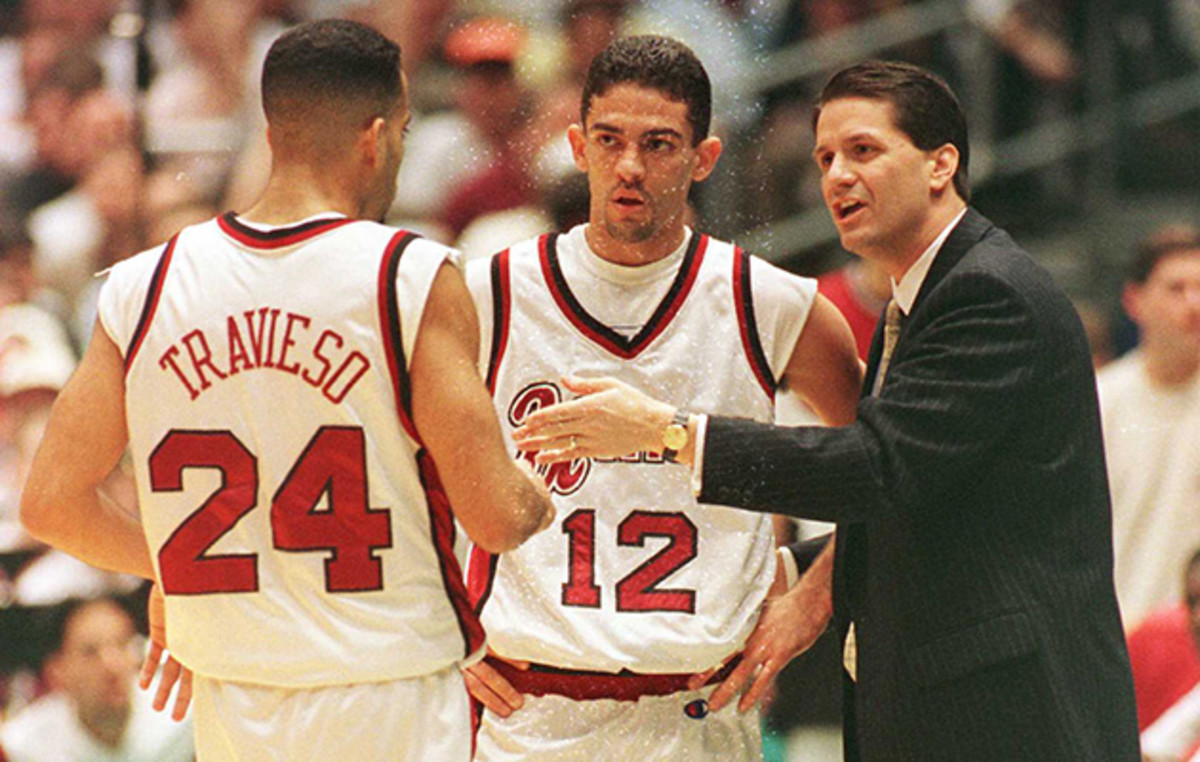Appreciating all that John Calipari has achieved en route to the Hall of Fame

You watch him strut into the arena wearing a $1,500 suit, brandishing a $7 million salary and coaching $100 million in future NBA talent, and you think to yourself, Now there’s a man who has it all. And on the face of it, you’re right. John Calipari has reached the pinnacle of his profession. He won an NCAA championship, he took three different schools to the Final Four, and this weekend he will be inducted into the Basketball Hall of Fame in Springfield, Massachusetts.
Calipari is grateful, yes, and more humble than many people realize. Yet, there is a big part of him that believes he still has to prove himself, every day, over and over again. The chip he inherited from his blue-collar upbringing in suburban Pittsburgh still sits firmly on his shoulder, the conspiracy theories still swarming inside his stubborn mind. While you are thinking he has it all, his inner voice is whispering, Remember all those sons-of-bitches who doubt you, who take shots at you, who still don’t think you belong inside the velvet ropes? Time to show them what you’re made of.
Even now, at 56, Calipari relies on this mind trick to get himself fired up to compete, whether it’s on the court, on the recruiting trail, or anywhere in the public domain. He is living proof that it doesn’t matter how much money, fame or success a man accrues. He is who he is.
What, you thought he came out of the womb wearing Armani? Not even close. Calipari’s father, John, was the ultimate grinder, an immigrant from Calabria, Italy, who toiled in coal mines before becoming an outdoor baggage handler at the Pittsburgh airport. Calipari’s mother, Donna, was a cafeteria worker at the local junior high school. The house had two bedrooms, but John also had two sisters, which usually meant he slept on a bed in the hallway. There were no silver spoons in sight.
• MORE: 64 things to be excited about this season, Part 1
After Calipari graduated Moon Township High School in 1979, he tried to play Division I ball at North Carolina-Wilmington, but after two years he realized he wasn’t good enough. So he transferred back home to Division II Clarion University, where he led the team in assists for two seasons. From there, he dove into coaching, turning enough heads at Five-Star Basketball Camp to earn a gig as a graduate assistant gig at Kansas. His duties there included serving peas and carrots to players in the cafeteria, and walking head coach Larry Brown’s dog.
Even back then, Calipari showed a unique ability to motivate. Howard Garfinkel, the longtime director of Five Star, recalls that when Calipari coached the younger campers, he looked for an opportunity early in a game to call time out and berate his best player. When Calipari did this to Danny Ferry, a burgeoning All-American at DeMatha Catholic High School, Garfinkel approached Ferry’s father, Bob, to apologize. Before he could get a word out, Bob told Garf, “That’s the best thing that has ever happened to Danny. No one has ever challenged him like that. That guy is going to be a great coach someday.”
This remains one of Calipari’s strengths. Yes, he recruits the top talent to Kentucky, but he also holds his players accountable. Too many college coaches do not know how to coach great players. Getting a bunch of high school All-Americans to play unselfishly, sacrifice minutes and buy in on defense takes a lot of will and guile. Calipari has those qualities in spades.

Does it surprise you to learn that as an undergraduate at Clarion, Calipari got his degree in marketing? Of course not. He has often said “everything in this game is marketing,” and you have to admit he’s right. Shortly after he got his first head coaching job at UMass in 1988, one of his initial decisions was to change the team’s jersey from reading “Massachusetts” to “UMass” so it would be more visible. He begged ESPN to put his team on national television, even if it meant tipping off at midnight. Before Calipari got to UMass, the program had not had a winning season in over ten years. It had been to exactly one NCAA tournament—in 1962. Yet, beginning in his fourth year, Calipari took the Minutemen to five consecutive NCAA tournaments, including three Sweet 16s and the 1996 Final Four. It is one of the most remarkable coaching jobs the sport has ever seen.
He maintained that philosophy wherever he has gone. I’ll never forget walking into Calipari’s office just before the start of his first season at Memphis. He was staring intently at sheets of paper spread across a table. Were they play formations? Scouting reports? Nope. They were images that were going to go on billboards all over town promoting his players. They wouldn’t go up until he gave his approval. Just market, baby.
Wisconsin's Bo Ryan doesn't seem ready to leave the Badgers just yet
It’s fair to say that no coach in America pays more attention to this aspect of the job. That turns people off, but Calipari has a way of winning over his detractors. Consider former Temple coach John Chaney, who once famously charged at Calipari during a postgame press conference shouting “I’ll kill you!” By the next season, Calipari had agreed to roast Chaney at a fundraiser for diabetes, and the two have been close friends ever since.
Calipari has had his share of low moments along the road to Springfield. There was the time when he was coaching the New Jersey Nets and he called a beat reporter a “Mexican idiot.” There are the two vacated Final Four appearances at UMass and Memphis. Calipari was not implicated in either case, but those decisions will always be the albatross hanging from his neck. This wounds Calipari more than he lets on, but he has found a way to laugh about it. When he turned 53 three years ago, he joked to reporters that the NCAA had vacated two of his birthdays, so he was really 51.
Calipari may be thin-skinned, but underneath runs a deep loyalty streak. When his longtime Pittsburgh buddy, John Robic, got fired as the head coach at Youngstown State, Calipari immediately called and offered him an assistant coaching job at Memphis. Robic is still on his staff at Kentucky. Calipari would have taken another Memphis assistant, Josh Pastner, to Lexington as well, but Pastner was surprised to be offered the chance to replace Calipari as the head coach at Memphis. Pastner was concerned that if he said yes, he would be disloyal, so he asked Calipari what he should do. “Let me make it easy for you,” Calipari said. “You are fired from the University of Kentucky.”
In his 2011 Sports Illustrated profile of Calipari, my colleague S.L. Price told the story of Bill Day, a cartoonist at the Memphis Commercial Appeal who had been fired during the NCAA tournament. Day barely knew Calipari, yet even though his team was getting ready to play a Sweet 16 game, the coach called Day to give him a pep talk. A month after he won the 2012 national championship at Kentucky, Calipari flew to Connecticut to be the guest speaker at a banquet for the boys basketball team at St. Joseph’s High School in Trumbull. None of the team’s players was remotely good enough to play at Kentucky, but Calipari went because the team’s coach, Vito Montelli, was a longtime friend. This allowed Calipari to deliver one of his favorite lines: “Coach Montelli called and said, ‘Do you believe in free speech?’ I said, ‘Of course.’ He said, ‘Good, because you’re gonna give one on May 10th.’”
• MORE: Which freshmen will have the biggest impact this season?
Montelli will be among Calipari’s invited guests this weekend. So will Garfinkel and the Five Star crew, along with half the city of Pittsburgh. They will be there to celebrate a man who ascended to great heights but never forgot where he came from.
Such is the bundle of contradictions that will take to the podium in Springfield: the flashy grinder, the humble marketer, the servant leader and conspiracy theorist with a Pittsburgh-sized chip on his shoulder. His chin jutted, his heart swelled, his spirit full of gratitude, John Calipari will officially assume his place among the game’s alltime greats. Then he will spend the rest of his career trying to prove he belongs.
